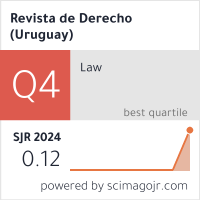Submissions
Submission Preparation Checklist
As part of the submission process, authors are required to check off their submission's compliance with all of the following items, and submissions may be returned to authors that do not adhere to these guidelines.- The submission has not been previously published, nor is it before another journal for consideration (or an explanation has been provided in Comments to the Editor).
- The text is single-spaced; uses a 12-point font; employs italics, rather than underlining (except with URL addresses); and all illustrations, figures, and tables are placed within the text at the appropriate points, rather than at the end.
- The text adheres to the stylistic and bibliographic requirements outlined in the Author Guidelines, which appear in About the journal under Submissions.
Doctrine
Formal rules for the publication of doctrine papers:
1. Short curriculum vitae of the author (maximum of 6 lines), including:
- a) Full name.
- b) Unique identifier of researcher ORCID
- c) Position and academic institution to which the researcher belongs.
- d) Email address.
- e) CRediT Author Contribution. This information is completed in the Declaration of Originality letter.
- f) Declare the availability or non-availability of data. Manuscripts should be submitted with a section called "Data availability", stating whether the dataset is available and, if so, where to access it. If the author has their research data on a server, this should be stated in the article. The following sentence should be included within the text: "The dataset supporting the results of this study is available at...". Possible repositories for depositing open research data are: REDATA, SciELO Data, Zenodo. In addition, the dataset should be cited. Otherwise, you should include a sentence within the article stating the following: "The dataset supporting the results of this study is not available".
2. Title of the work in English, Spanish and Portuguese.
3. An abstract of the manuscript in English, Spanish and Portuguese (between 100 and 200 words).
4. Between 3 and 5 keywords of the manuscript in English, Spanish and Portuguese.
The different sections of the paper should be structured according to Arabic numbering: 1., 1.1., 1.1.2. and so on.
The acronyms to be included must be accompanied by their meaning, in brackets, the first time they are used. Example: CC (Civil Code).
Formal rules of textual citation:
In order to initiate the arbitration process, citations and bibliographical references in the texts sent to Revista de Derecho will be made in accordance with the APA (American Psychological Association) standards https://apastyle.apa.org/ and the APA Style manual: guide with examples and adaptations for Uruguay by the APA Uruguay Group.
Textual citations will be made according to the author-date system, also indicating the page number of the source. Example: (Bugallo, 2006, p. 484).
If the quotation contains less than 40 words, it should be enclosed in double inverted commas.
If the quotation contains 40 words or more, it is written in a block paragraph with an indentation of 1.25 cm.
Paraphrased quotations are also to be made according to the author-date system, the quotation is not enclosed in inverted commas and the format of the paragraph is not changed, it is not necessary to indicate the page of the source. The reference of the paraphrased quotation must be added to the list of bibliographical references.
The references of the cited sources are listed in a separate paragraph with a French indentation of 1.25 cm and are ordered alphabetically under the heading Bibliographical references.
Annotated jurisprudence
Formal rules for the publication of doctrine papers:
1. Author(s) details: full name, unique ORCID researcher identifier (can be obtained at the following link: ORCID), position and academic institution to which he/she belongs, e-mail address for correspondence with the journal. Percentage of the author's contribution to the research. State the availability or non-availability of data as follows:
Data availability:
Manuscripts should be submitted with a section called "Data availability", informing whether the dataset is available and, if so, where to access it.
In case the author has his or her research data on a server, this should be stated in the article.
The following sentence should be included within the text:
"The dataset supporting the results of this study is available at...".
Otherwise, you should include a sentence within the article stating the following:
"The dataset supporting the results of this study is not available".
In addition, the dataset should be cited.
2. Abstract of the paper in Spanish, English and Portuguese (between 100 and 200 words).
3. Establish between 3 and 5 key words of the paper in Spanish, English and Portuguese.
The different sections of the paper should be structured according to Arabic numbering: 1., 1.1., 1.1.2. and so on.
The acronyms to be included must be accompanied by their meaning, in brackets, the first time they are used. Example: CC (Civil Code).
Formal rules of textual citation:
In order to initiate the arbitration process, citations and bibliographical references in the texts sent to Revista de Derecho will be made in accordance with the APA (American Psychological Association) standards https://apastyle.apa.org/ and the APA Style manual: guide with examples and adaptations for Uruguay by the APA Uruguay Group.
Textual citations will be made according to the author-date system, also indicating the page number of the source. Example: (Bugallo, 2006, p. 484).
If the quotation contains less than 40 words, it should be enclosed in double inverted commas.
If the quotation contains 40 words or more, it is written in a block paragraph with an indentation of 1.25 cm.
Paraphrased quotations are also to be made according to the author-date system, the quotation is not enclosed in inverted commas and the format of the paragraph is not changed, it is not necessary to indicate the page of the source. The reference of the paraphrased quotation must be added to the list of bibliographical references.
The references of the cited sources are listed in a separate paragraph with a French indentation of 1.25 cm and are ordered alphabetically under the heading Bibliographical references.
Privacy Statement
The names and email addresses entered in this journal site will be used exclusively for the stated purposes of this journal and will not be made available for any other purpose or to any other party.

















 This work is under a
This work is under a 